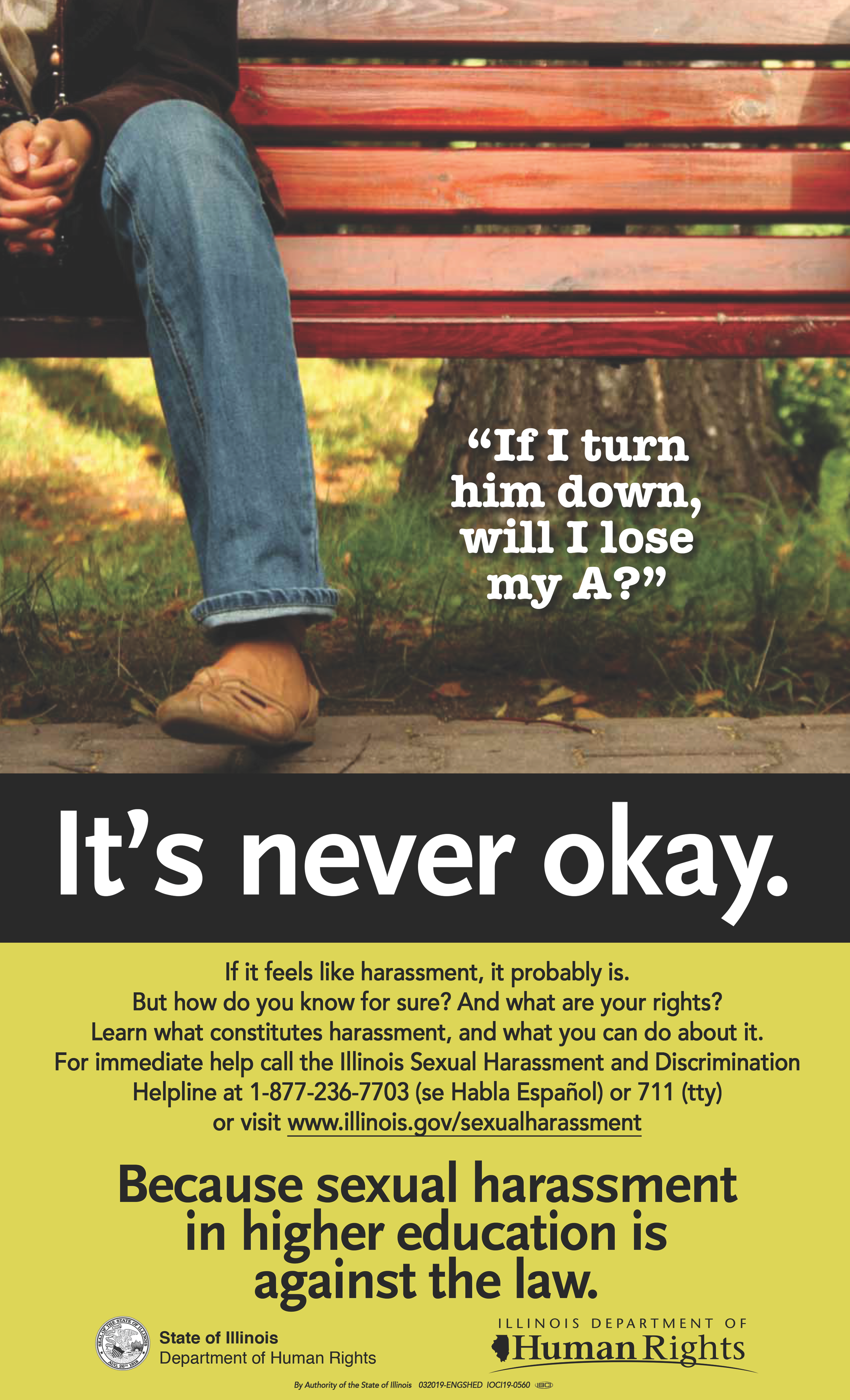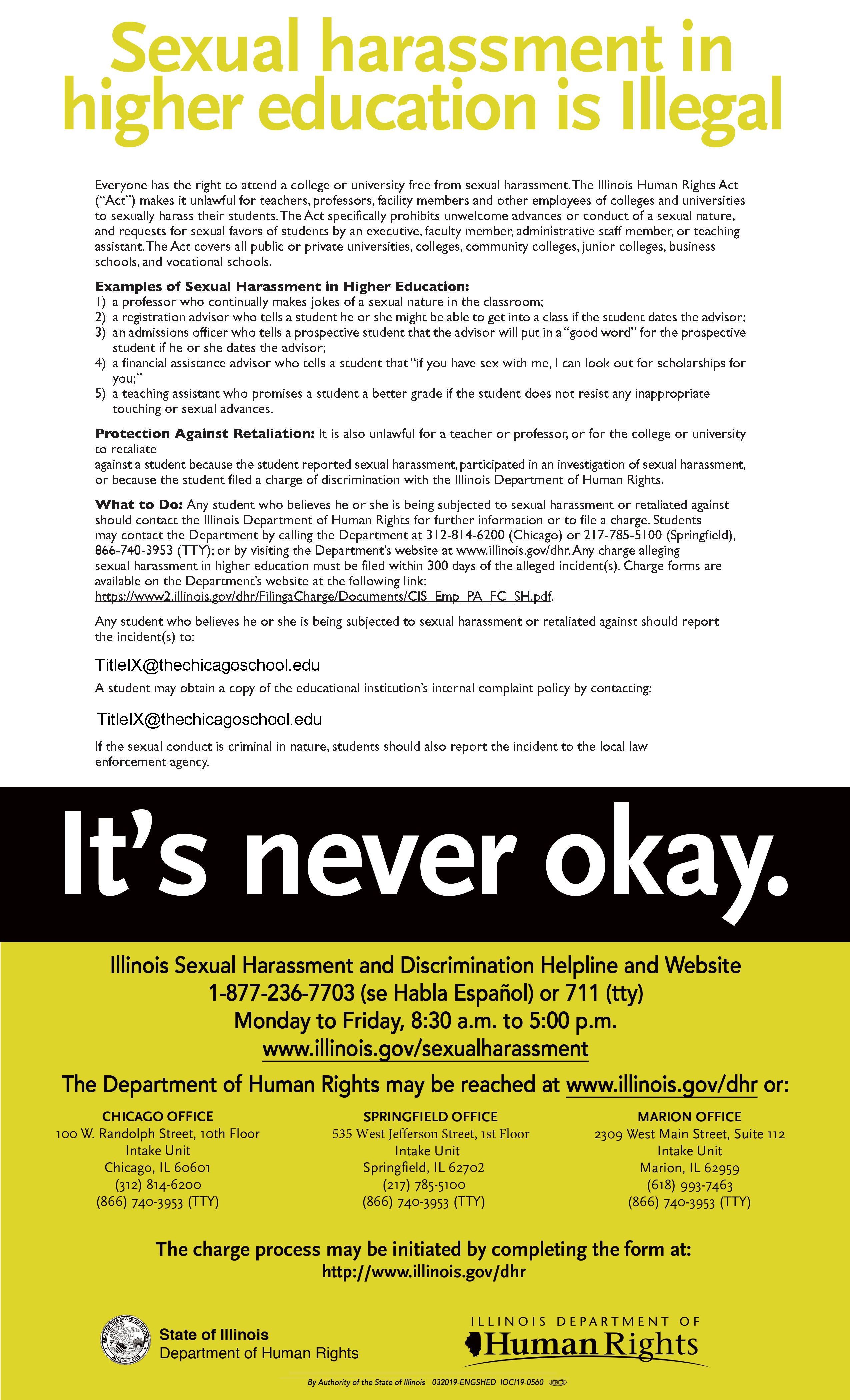Sexual HARASSMENT Prevention and Awareness
If You Experience Sexual Harassment
While The Chicago School prohibits all acts of sexual harassment, should you find yourself in a situation where sexual assault has occurred, you are encouraged to do the following:
-
Find a Safe Place: Get to a safe place as soon as you can. If you believe you or anyone else is in immediate danger, alert law enforcement. Once you are safe, contact someone you trust to be with you for support. This could be a friend, family member, or even a specially-trained advocate.
-
Get Medical Attention: Medical attention should be sought as soon as possible. This is necessary to mitigate the risk of sexually transmitted infections or pregnancy and to determine the existence or extent of, and to treat, any physical injury. Additionally, forensic evidence can be collected if criminal action is or may be desired in the future.
-
Preserve Evidence of the Incident: It is important to preserve evidence as it may be necessary in providing proof of criminal activity or in obtaining a protection order. Evidence is best collected as soon as possible or within 96 hours of the assault. Assistance with evidence preservation can be provided by medical and/or law enforcement personnel.
-
Consider Reporting the Incident: There are several reporting options including reporting to local law enforcement and/or reporting to the Title IX Coordinator. School officials will assist in notifying law enforcement, if requested. Reporting sexual assault, domestic violence, dating violence, and stalking to the police does not commit you to further action. While you are not required to report to local law enforcement in order to receive assistance or pursue options within The Chicago School, the earlier an incident is reported, the easier it will be for the police to investigate if you decide to proceed with criminal charges. If a reported incident did not occur on campus, The Chicago School can assist you in notifying the local police department with jurisdiction over the crime.
-
Seek Counseling and Other Supports: The Chicago School encourages survivors of sexual harassment to talk to someone about what has happened, which may include counseling. Whether services are sought through Student Solutions or in the community, remember that self-care is an important coping strategy.
How to be an Active Bystander
Bystanders play a critical role in the prevention of violence. A bystander is an “individual who observes violence or witnesses the conditions that perpetuate violence. They are not directly involved but has the choice to intervene, speak up, or do something about it.” The Chicago School aims to promote a culture of community accountability where bystanders are actively engaged in the prevention of violence without causing further harm.
A bystander may not always know what to do even if they want to help. Below is a list of some ways to be an active bystander. Further information regarding bystander intervention may be found. If you or someone else is in immediate danger, dial 9-1-1. This could be when a person is yelling at or being physically abusive towards another and it is not safe for you to interrupt.
-
Watch out for your friends and fellow students/employees. If you see someone who looks like they could be in trouble or need help, ask if they are okay.
-
Confront people who seclude, hit on, try to kiss, or have sex with people who are incapacitated.
-
Speak up when someone discusses plans to take sexual advantage of another person.
-
Believe someone who discloses sexual assault, abusive behavior, or experience with stalking.
-
Refer people to on or off campus resources for support with health, counseling, or legal services.
-
View a Chicago School-hosted expert panel on bystander intervention and survivor rights:
#TimesUpForThatToo: Recognizing and Responding to Non-Physical Forms of Sexual Misconduct.
Risk Reduction Tips
With no intent to victim blame and recognizing that only rapists are responsible for rape, the following are some strategies to reduce risk related to sexual assault or harassment.
-
Be aware of your surroundings. Knowing where you are and who is around you may help you to find a way to get out of a bad situation.
-
Try to avoid isolated areas. It is more difficult to get help if no one is around.
-
Walk with purpose. Even if you don’t know where you are going, act like you do.
-
Trust your instincts. If a situation or location feels unsafe or uncomfortable, it probably isn’t the best place to be.
-
Try not to load yourself down with packages or bags as this can make you appear more vulnerable.
-
Make sure your cell phone is with you and charged and that you are carrying some cash.
-
Don’t allow yourself to be isolated with someone you don’t trust or someone you don’t know.
-
Avoid putting headphones in both of your ears so that you stay aware of your surroundings, especially if you are walking alone.
-
When you go to a social gathering, go with a group of friends. Arrive together, check in with each other throughout the evening, and leave together. Knowing where you are and who is around you may help you to find a way out of a bad situation.
-
Trust your instincts. If you feel unsafe in any situation, go with your gut. If you see something suspicious, contact law enforcement immediately (local authorities can be reached by calling 9-1-1 in most areas of the U.S.).
-
Don’t leave your drink unattended while talking, dancing, using the restroom, or making a phone call. If you’ve left your drink alone, get a new one.
-
Don’t accept drinks from people you don’t know or trust. If you choose to accept a drink, go with the person to the bar to order it, watch it being poured, and carry it yourself. At parties, don’t drink from the punch bowls or other large, common open containers.
-
Watch out for your friends, and vice versa. If a friend seems out of it, is too intoxicated for the amount of alcohol they have consumed, or is acting out of character, get them to a safe place immediately.
-
If you suspect you or a friend has been drugged, contact law enforcement immediately (local authorities can be reached by calling 9-1-1 in most areas of the U.S.). Be explicit with doctors so they can give you the correct tests (you will need a urine test and possibly others).
-
If you need to get out of an uncomfortable or scary situation, here are some things that you can try:
-
Remember that being in this situation is not your fault. You did not do anything wrong.
-
Be true to yourself. Don’t feel obligated to do anything you don’t want to do. “I don’t want to” is always a good enough reason. Do what feels right to you and what you are comfortable with.
-
Use a code word with your friends or family so that if you feel uncomfortable, you can call them and communicate your discomfort without the person you are with knowing. Your friends or family can then come to where you are or make up an excuse for you to leave.
-
Lie. If you don’t want to hurt the person’s feelings, it is better to lie and make up a reason to leave than to stay and be uncomfortable, scared, or worse. Some excuses you could use are: needing to take care of a friend or family member, not feeling well, having somewhere else that you need to be, etc.
-
Try to think of an escape route. How would you try to get out of the room? Where are the doors? Windows? Are there people around who might be able to help you? Is there an emergency phone nearby?
-
If you and/or the other person have been drinking, you can say that you would rather wait until you both have your full judgment before doing anything you may regret later.
Chicago Harassment Information

